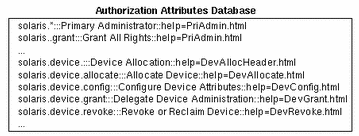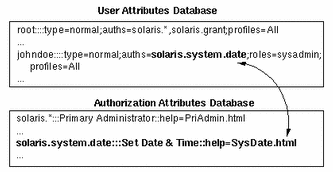Authorizations
An authorization is a user right that grants access to a restricted function. It is a unique string that identifies what is being authorized as well as who created the authorization.
Authorizations are checked by certain privileged programs to determine whether users can execute restricted functionality. For example, the solaris.jobs.admin authorization is required for one user to edit another user's crontab file.
All authorizations are stored in the auth_attr database. Authorizations may be assigned directly to users (or roles) in which case they are entered in the user_attr database. Authorizations can also be assigned to execution profiles which in turn are assigned to users.
The fields in the auth_attr database are separated by colons:
authname:res1:res2:short_desc:long_desc:attr |
The fields are described in the following table.
|
Field Name |
Description |
|---|---|
|
authname |
A unique character string used to identify the authorization in the format prefix.[suffix]. Authorizations for the Solaris operating environment use solaris as a prefix. All other authorizations should use a prefix that begins with the reverse-order Internet domain name of the organization that creates the authorization (for example, com.xyzcompany). The suffix indicates what is being authorized, typically the functional area and operation. When there is no suffix (that is, the authname consists of a prefix and functional area and ends with a period), the authname serves as a heading for use by applications in their GUIs rather than as an authorization. The authname solaris.printmgr. is an example of a heading. When authname ends with the word grant, the authname serves as a grant authorization and lets the user delegate related authorizations (that is, authorizations with the same prefix and functional area) to other users. The authname solaris.printmgr.grant is an example of a grant authorization; it gives the user the right to delegate such authorizations as solaris.printmgr.admin and solaris.printmgr.nobanner to other users. |
|
res1 |
Reserved for future use. |
|
res2 |
Reserved for future use. |
|
short_desc |
A terse name for the authorization suitable for displaying in user interfaces, such as in a scrolling list in a GUI. |
|
long_desc |
A long description. This field identifies the purpose of the authorization, the applications in which it is used, and the type of user interested in using it. The long description can be displayed in the help text of an application. |
|
attr |
An optional list of semicolon-separated (;) key-value pairs that describe the attributes of an authorization. Zero or more keys may be specified. The keyword help identifies a help file in HTML. Help files can be accessed from the index.html file in the /usr/lib/help/auths/locale/Cdirectory. |
An auth_attr database with some typical values is shown in the following example.

The relationship between the auth_attr and the user_attr databases is illustrated in the following example. The solaris.system.date authorization, which is defined in the auth_attr database, is assigned to the user johndoe in the user_attr database.

- © 2010, Oracle Corporation and/or its affiliates
